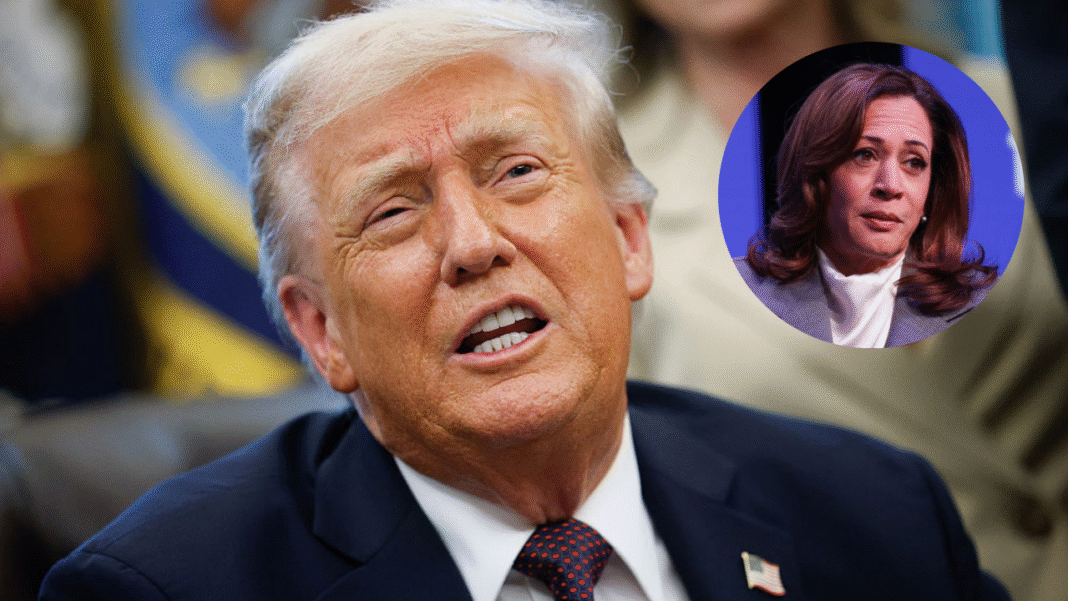Trump vs. Harris: A Clash on Truth Social
On a recent Wednesday, former President Donald Trump took to his Truth Social platform to unleash a tirade against his 2024 presidential opponent, current Vice President Kamala Harris. Trump didn’t hold back, labeling Harris as “DUMB AS A ROCK” and challenging her claims about the tightness of their upcoming electoral contest.
Harris’ Claims and Trump’s Response
Harris had been promoting her new memoir, “107 Days,” and asserted that the election race against Trump would be the closest in the 21st century. This assertion seemed to strike a nerve with Trump, who quickly dismissed it as falsehood. In his post, he referred to this claim as a “lie,” backed by a citation from Fox News, arguing that the facts speak for themselves.
The Electoral Landscape
While Trump references his decisive victory in the Electoral College—where he won 312 votes to Harris’s 226—his arguments don’t fully encapsulate the popular vote dynamics. While Harris can acknowledge that she received over 75 million votes, making her the third highest in U.S. presidential history, Trump’s victory was also marked by significant margins in critical swing states. He emphasized that he won the Electoral College convincingly, pointing to a dominance in important battleground areas.
The Numbers Game
Trump’s post included not just his Electoral College claims but also emphasized his success across different metrics. He noted that he had secured all seven swing states and cited a vast lead in counties nationwide—2,600 to 525. However, this perspective is overshadowed by the fact that Harris’s vote count ranks behind only Trump and former President Joe Biden, the latter who amassed over 81 million votes in the last election.
Comparisons to Historical Elections
Trump, in his defense, drew parallels to previous elections, most notably the 2000 presidential race between George W. Bush and Al Gore, which was famously decided by a razor-thin margin of just 537 votes from Florida. Trump insisted that many elections historically were much closer, implying that Harris’s claim was exaggerated.
However, even Trump’s own 2020 contest against Biden saw a significant popular vote disparity. Biden’s victory was larger—over 7 million votes—compared to the potential popular vote difference projected for a 2024 showdown between Trump and Harris, estimated to be over 2.2 million.
Misinformation and Election Integrity
Trump’s fixation on election narratives isn’t new. His false claims about voter fraud in the 2016 and 2020 elections have echoed throughout his political career. Despite numerous debunked assertions, he has consistently alleged that millions of illegal votes swayed the outcomes against him. These claims were further amplified by his push to overturn the results of the 2020 election.
Such rhetoric laid the groundwork for the violent events of January 6, 2021, when a mob attacked the U.S. Capitol, spurred on by Trump’s allegations of a stolen election. This led to significant legal consequences for many of his supporters, with over 1,500 individuals charged in relation to the riots.
Legal Fallout for Trump
The ramifications of Trump’s election claims have extended beyond rhetoric. A federal investigation into his attempts to overturn the 2020 results led to criminal charges of conspiracy to defraud the United States. Despite a tumultuous period in U.S. politics that questioned the integrity of the electoral process, these charges were later dropped, keeping the political narrative fluid.
As Trump contemplates a return to the presidency, the stage is set for a contentious election year as he and Harris prepare to face off amidst a backdrop of historical precedents, hard-fought battles for public opinion, and a rich tapestry of electoral history.



